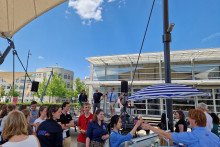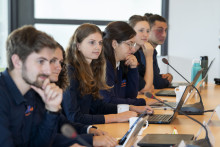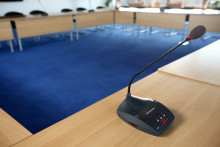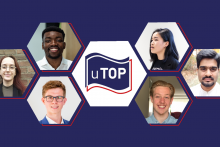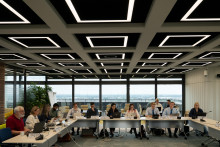‘Did you vote?’ Such was the main question of the leafleters in the square in anticipation of the debate. As the two front-runners climbed the mobile stage, a long queue formed in front of the flown-in ice cream stand. As a result, the turnout at this year's electoral debate was substantial. A smart move by the council, even though the debate took place in a somewhat noisy setting due to the cheerfully chatting students in the queue.
Binding study advice
For the central participation body, the university council, there are two flavours this year: UReka and DAS. Led by chair of the University Council Herbert Wormeester, the two front-runners, Sabin Kerwien Lopez (UReka) and Robin Kamphuis (DAS), addressed various topics currently occupying the university world, such as the binding study advice (BSA), the (stop on) internationalisation and student wellbeing.
‘According to you, what is the most important topic?’, Wormeester asked the two candidates at the start of the debate. Kamphuis chose the BSA, which is going to a maximum of 30 points if it is up to education minister Dijkgraaf. ‘We don’t think these measures are going to solve the problem. The current BSA standard is very strict - a few errors along the way and you have to leave, but we see more in a personal approach, where students decide on their own progress in consultation with a student advisor.’
Kerwien Lopez endorsed this. According to her, the new BSA system, which requires students to still achieve 60 points in the second year, is a stay of execution. ‘It actually creates more stress if students fail in the second year. That is why we are against the current plan.’
Internationalisation
Besides the BSA, the two front-runners considered the topic of internationalisation. The calls from The Hague regarding more room for Dutch in higher education are becoming louder and louder. Are we going to hold this debate in Dutch next year, Wormeester pondered. The two students did not dare to comment on that, but both UReka and DAS stressed the importance of English at the UT. However: the language proficiency of both teachers and students need to improve, the lead candidates of both parties argued.
Expanding upon the topic of internationalisation, Kamphuis argued that international students are not sufficiently involved in student activism at the UT. For the party committed to 'the ambitious student', this is an eyesore. He called for equal opportunities, so that internationals can also participate in an active student life. Kerwien Lopez mentioned student wellbeing as an important item on the UReka programme. ‘We expect the UT to have a clear vision for the coming years.’ According to her, the same applies for the sustainability policy. ‘We really need to pick it up with speed.’
Lack of space
Chairman Wormeester finally touched on the shortage of space on campus. Is there still a lack of facilities, he wanted to know. ‘We are getting no such complaints,’ Kamphuis responded. But Lopez could not quite agree with this answer. ‘There is a lack of space at the UT. For example, we heared from several study associations that they cannot find spaces on campus to organise their activities. This forces them to rent expensive locations in Enschede instead.’
As the end of the debate approached, the ice cream man appeared to have run out of his supply. ‘Do you have one last message?’, Wormeester asked. ‘DAS stands for the active student, who develops alongside studying,’ Kamphuis responded. ‘If you think that's important, vote for DAS.’ Kerwien Lopez opted for a cross-party message. ‘Above all, go out there and vote, because we have the power to change things at UT.’


